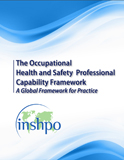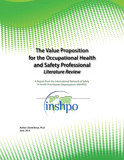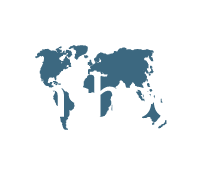Our Work
The OHS Professional Capability Framework: A Global Framework for Practice

INSHPO developed the OHS Professional Capability Framework to provide greater clarity around the generalist OHS professional role. The Framework defines the role of the OHS professional as well as the requisite knowledge and skills. The framework promotes a high standard of capability among OHS professionals and in turn informs employers and regulators as to the capabilities of OHS professionals. The sections on knowledge and skills provide benchmarks for education and training bodies and OHS professional associations in their development of the detail of certification schemes, educational programs and continuing professional development.
Pryor, Pam, et al. “Development of a Global Framework for OHS Professional Practice.” Safety Science, vol. 117, 2019, pp. 404–416.
INSHPO recommends reading this paper from the Safety Science journal about the development of the OHS Capability Framework.
Case Studies - Find out how the Framework is being utilized
The Value Proposition for the Occupational Health and Safety Professional: A Literature Review

INSHPO commissioned this research report with the purpose of reviewing the evidence in support of the value proposition for the occupational health and safety professional. This report makes a small contribution to a range of activities currently being undertaken by INSHPO that are designed to strengthen the OHS profession's international standing and acceptance as a profession.
OHS Body of Knowledge
A profession’s Body of Knowledge is a key “trait” required to clearly define the profession’s competence territory. The Body of Knowledge provides the underlying knowledge base required for professionals to competently perform their jobs and apply principles to practice.
Any Body of Knowledge must be periodically re-evaluated and is the basis for course and curriculum design, program accreditation and professional certification. Organizations may define their Bodies of Knowledge in terms of learning outcomes, content domains and competency categories.
INSHPO is collaborating with the Australian Institute of Health and Safety who have developed the OHS Body of Knowledge for Generalist OHS Professionals. First published in 2012, the OHS Body is continually being expanded and updated, and is freely available via the web site.
As part of the liaison with INSHPO and the Global OHS Capability Framework the OHS Body of Knowledge has been mapped to the Knowledge topics in the Framework. This provides a useful reference for OHS students, OHS educators and OHS professionals planning their continuing professional development.
Competency
A profession’s core competencies can be defined as the identified knowledge, skills and behaviors that are necessary to effectively perform a job. Core competencies reflect masters of the Body of Knowledge and may also include “soft” competencies such as leadership and other interpersonal skills.
Defined competencies help safety professionals identify training and developmental needs. They also may serve as the basis for certifications and other forms of qualifications around the world.
A defined set of core competencies for the OSH profession will facilitate the practice of OSH internationally as it clearly draws a line around the profession’s competence terrain.
INSHPO is currently continuing a survey first implemented in Europe and expanding it to include data from North America, Singapore, Russia, South Korea and others.
Model Codes of Conduct
INSHPO has developed a set of recommended minimum commitments for Member Organizations’ Codes of Conduct/Ethics.
Member organizations are not expected to adopt the exact wording of the Model Code of Conduct.
Primary duty/loyalty/Adherence to relevant laws: Make informed decisions in the performance of professional duties that adhere to all relevant laws, regulations, and recognized standards of practice.
Obligation to inform: Inform all appropriate parties when professional judgment indicates that there is an unacceptable level of risk of injury, illness, property damage, or environmental harm while protecting the confidentiality of all professionally acquired information and disclose such information only when properly authorized or when legally obligated to do so.
Integrity/Objectivity: Maintain honesty, integrity, and objectivity in all professional activities.
Conflict of Interest: Avoid all situations that create real or perceived conflicts of interest, and provide full disclosure of those conflicts to all potentially affected parties.
Reputation: Abstain from behavior that will unjustly cause harm to the reputation of INSHPO, its member organizations, and the profession.
Competency: Perform only those services that may be handled competently based on one's training and experience.
Maintenance of Knowledge/Continuing Education: Maintain, and, where possible, develop professional competence through the professional development program as provided by relevant domestic professional association, or other training, education, networking, or work experience.
Confidentiality: Take all reasonable steps to preserve the confidentiality of information acquired through professional practice.
Misrepresentation of Qualifications: Do not falsely represent professional qualifications, including education, credentials, designations, affiliations, titles, and work experience.
